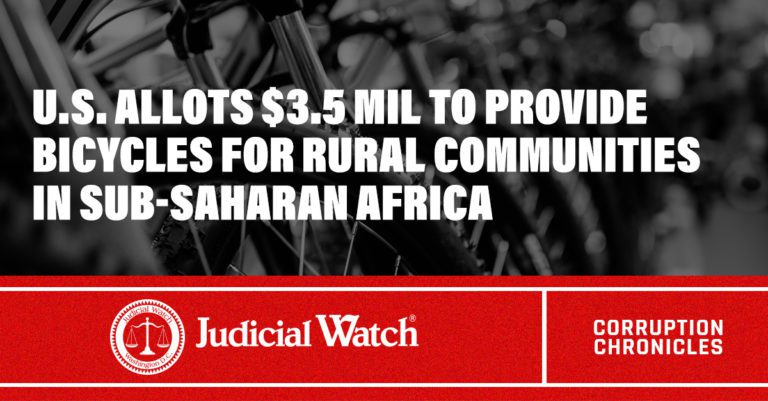

U.S. Allots $3.5 Mil to Provide Bicycles for Rural Communities in Sub-Saharan Africa


While Americans struggle through pandemic-induced financial hardships and a supply chain crisis, the U.S. government is dedicating millions of dollars to provide bicycles for residents of sub-Saharan Africa. It’s worth mentioning that some of the world’s largest bike manufacturers have been heavily impacted by the unprecedented supply chain delays, resulting in a “global bicycle shortage,” according to an international business publication. Additionally, bike prices are climbing and buying one at a reasonable price is proving to be difficult for many Americans, a financial news website reported recently.
Domestic shortages and affordability issues are not stopping Uncle Sam from funding an international program, known as Bicycles for Growth Initiative, that aims to improve sustainable access to affordable bicycles in sub-Saharan Africa, which includes dozens of countries. The U.S. will allocate $3.5 million to the project, according to an announcement issued this week by the United States Agency for International Development (USAID), the huge State Department offshoot with a $40 billion budget that annually doles out gigantic sums to foreign causes, including a multitude of leftist groups around the globe. The investment of American tax dollars is expected to increase mobility in rural sub-Saharan African areas by developing a means to rapidly increase bicycle uptake for individuals who cannot afford or do not have access to other transportation, USAID reveals. That will facilitate the opportunity for higher incomes and better health and education outcomes, the agency writes in its announcement.
“Many communities throughout sub-Saharan Africa struggle to access health services, education, economic opportunities, and basic social services due to long distances and limited transportation options,” the USAID statement reads. “For rural communities, these challenges are particularly acute. Walking is the main mode of transportation in many parts of sub-Saharan Africa. Bicycles can provide an affordable, accessible, reliable, and efficient alternative to walking, offering more carrying capacity and easier access to necessary destinations.” The document proceeds to disclose that more than 70% of sub-Saharan Africa’s rural residents must traverse long distances without access to roads or transportation to commute to work, transport goods to market, travel to school, or obtain medical care.
Bikes evidently will help alleviate the problem, making the multi-million-dollar project serious business that will be studied in-depth by experts. This month’s allocation will finance research on the supply, demand and supporting systems for access to bikes in the African nations of Ghana, Malawi, Rwanda, Uganda, and Zambia. More American money is likely to flow to the African bike initiative considering the language in USAID’s announcement. “Based on the results of the assessment phase, the teams will implement pilot projects in four to six localities across two of these countries with the goal of reducing barriers to increased supply and uptake of low-cost, durable, and adjustable bicycles,” the agency writes. USAID describes the U.S.-funded African bicycle program as a simple but effective approach to addressing a common development challenge.
While the government cash flows across the Atlantic, nearly half of Americans struggle with financial hardship caused by the economic fallout of COVID-19, according to a survey conducted by a global financial firm. Forty percent of those surveyed said it will take years to recover financially and 31% have borrowed money from family or friends. A separate poll conducted jointly by an Ivy League university and a national, government-funded media outlet found that nearly 40% of U.S. households are facing serious financial problems as the Delta variant outbreak extends health and economic problems ignited by the COVID-19 pandemic. The nonpartisan thinktank Pew Research Center reports that the economic fallout from the pandemic is hitting low-income adults, Hispanics, and Asian Americans hardest with that demographic experiencing higher rate of job loss or pay cut since the outbreak began in early 2020. “Among those who’ve had these experiences, lower-income and Black adults are particularly likely to say they have taken on debt or put off paying their bills in order to cover lost wages or salary,” researchers found. Wonder how those folks feel about their government spending millions to purchase bikes for sub-Saharan Africans?














